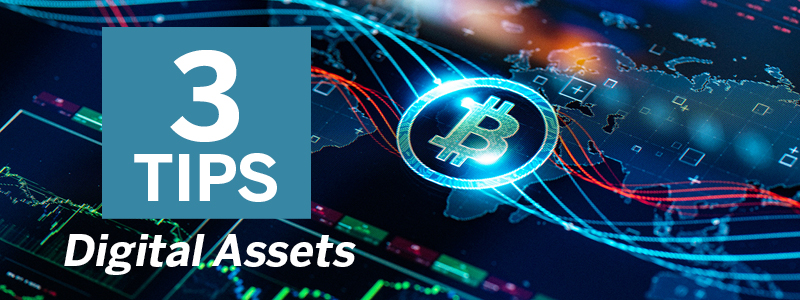
Do you have questions about digital assets? Are you lost when you hear words like ‘blockchain’ and ‘cryptocurrency’? Don’t worry, attorney Joshua Franklin has you covered with three things you should know about digital assets.
By Joshua D. Franklin
By now, most of us know at least one fact about cryptocurrency or blockchain; others know somebody who can give a crash course. The new wave of digital assets like Bitcoin and Ethereum, and the adoption of blockchain technology, has become an everyday conversation among investors, businesses, and hobbyists. Within the financial industry, digital assets have created new interest in processing payments and exchanging goods, but the story is just beginning. Digital assets and blockchain also implicate intellectual property, data security, real estate, and much more. As corporations and governments learn and experiment with cryptocurrency, more people have an increased interest in the technology.
What Is a Cryptocurrency?
A cryptocurrency is a unit of data used to record transactions. Similar to binary code that make up computer text, cryptography creates output functions in the form of cryptocurrency. Computer scientists began experimenting with cryptocurrency as a digital asset in the late 1990s and by 2008, the most famous whitepaper titled “Bitcoin: A Peer-to Peer Electronic Cash System” was published on an online forum for cryptographers. Today, there are over one thousand cryptocurrencies with different uses and capabilities.
Cryptocurrency units are transferred using a mathematical equation that is processed and verified by blockchain software functions. Cryptocurrency is transferred when a computer verifies and records the cryptographic hash function on the blockchain. Once the function is recorded, the transaction is immutable. In all forms, cryptocurrency is an asset; however, such an asset may have more than monetary value.
What Is Blockchain and How Does It Relate to Cryptocurrency?
A blockchain is a ledger that records and publishes the date, time, and cryptographic information regarding a cryptocurrency transaction. Each transaction is grouped in a block, which is verified by all previous blocks. The blockchain is to ensure accuracy and prevent any unauthorized changes.
Popular blockchain networks today include Bitcoin and Ethereum, among others. Each blockchain has separate functions and uses to operate with different cryptocurrencies. The Bitcoin is transacted on a blockchain verified by computers that earn bitcoin for securing the network. The Ethereum network is created and verified by computers that designate a large number of Ether to verify and validate transfers on the network.
What Should I Know about Blockchain and Cryptocurrency?
Cryptocurrency and blockchain are more than a new financial asset; the technology transcends multiple industries. Particularly in finance, implementing cryptocurrency payments requires familiarity with Know Your Customer regulations and a strong Anti-Money Laundering compliance program. A company that creates its own cryptocurrency to reward customers will need to consider the cryptocurrency’s price and utility, which will determine whether the asset will be regulated as a security or a commodity. Outside of the financial industry, corporations are also experimenting with cryptocurrency and blockchain as a tool for sharing and verifying information. Microsoft and Oracle have utilized blockchain and cryptocurrency to secure and transfer confidential information. Similar to firewall security settings, blockchains can verify credentials and ensure that all information is trusted and authorized.
Also, cryptocurrency is not limited to corporations. Freelancers and families are now using cryptocurrency to trade digital art or create long-term investments. Freelancers often create or trade non-fungible tokens, commonly known as NFTs. Artists create a digital replica of an asset and trade it as a token. As the NFT becomes more valuable, consumers may offer more cryptocurrency in exchange for the NFT.
Conclusion
From dog coins to NFTs, a growing number of entrepreneurs and businesses are utilizing blockchain and cryptocurrency. Today, digital assets may implicate federal securities and commodities laws, intellectual property laws, and even international data privacy regulations.
Although the risks associated with the technology are complex, individuals and corporations are quickly adapting and implementing the new technology. Lawmakers are now quickly regulating digital assets and companies are quickly understanding and building and operating blockchains with cryptocurrency. As attorneys configure digital assets, we must learn the risks of blockchain and cryptocurrency, while also encouraging clients and colleagues to safely innovate with the evolving technology.
 Joshua D. Franklin
Joshua D. Franklin
joshua.franklin@mitchellhamline.edu
Joshua Franklin is a graduate of Mitchell Hamline School of Law in Saint Paul, NY and native of Brooklyn, NY. Mr. Franklin is currently advising small businesses and decentralized autonomous organizations (DAOs). Previously, Mr. Franklin was a Litigation Associate at Barnes & Thornburg, LLP serving as counsel in the Aviation, FinTech, and White Collar & Investigations practice groups.
Joshua D. Franklin
joshua.franklin@mitchellhamline.edu
Joshua Franklin is dedicated to honorable achievement in every field of human endeavor. A native of Brooklyn, NY and HBCU graduate, Mr. Franklin currently resides in Minnesota and was employed as an attorney at Barnes & Thornburg, as a member of the Litigation Department serving as counsel in the Aviation; FinTech; Private Client Services; White Collar & Investigations practice groups.
Joshua D. Franklin
joshua.franklin@mitchellhamline.edu
Joshua Franklin is dedicated to honorable achievement in every field of human endeavor. A native of Brooklyn, NY and HBCU graduate, Mr. Franklin currently resides in Minnesota and was employed as an attorney at Barnes & Thornburg, as a member of the Litigation Department serving as counsel in the Aviation; FinTech; Private Client Services; White Collar & Investigations practice groups.
Joshua D. Franklin
joshua.franklin@mitchellhamline.edu
Joshua Franklin is dedicated to honorable achievement in every field of human endeavor. A native of Brooklyn, NY and HBCU graduate, Mr. Franklin currently resides in Minnesota and was employed as an attorney at Barnes & Thornburg, as a member of the Litigation Department serving as counsel in the Aviation; FinTech; Private Client Services; White Collar & Investigations practice groups.